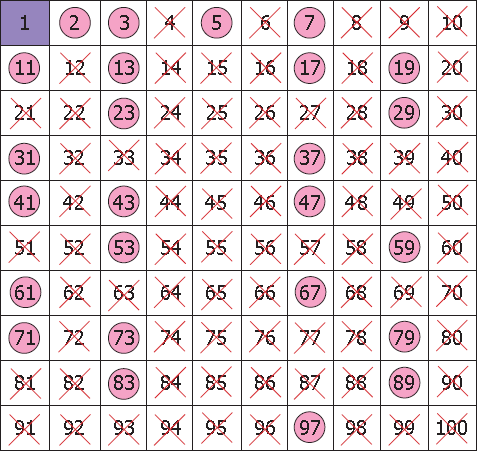FINDING THE PRIME NUMBERS BY SIEVE OF ERATOSTHENES METHOD
Sieve of Eratosthenes, is a simple method of elimination by which we can easily find the prime numbers up to a given number. This method given by a Greek mathematician, Eratosthenes of Alexandria, follows some simple steps which are listed below, by which we can find the prime numbers.
Step 1 :
Create 10 rows and 10 columns and write the numbers from 1 to 10 in the first row, 11 to 20 in the second row and continue the same as 91 to 100 in the tenth row.
Step 2 :
Leave 1 as it is neither prime nor composite (Why?). Start with the smallest prime 2. Encircle and color 2 and cross out all other multiples of 2 (all even numbers) in the grid.
Step 3 :
Now, take the next prime 3. Encircle and color 3 and cross out all other multiples of 3 in the grid.
Step 4 :
As 4 is crossed out already, go for the next prime 5 and cross out multiples of 5, except 5.
Step 5 :
Keep doing this, for two more primes 7 and 11 and stop. (Think why?)
The above steps are carried out to find prime numbers up to 100 in the following grid.

From the Sieve of Eratosthenes, we observe that,
● The crossed-out numbers are composite and the colored numbers (encircled) are primes.
● The total number of primes up to 100 is 25.
● The only prime number that ends with 5 is 5.
● 2 is the only even prime number.
● The smallest one-digit prime number is 2.
● The largest one-digit prime number is 7.
● The smallest two-digit prime number is 11.
● The largest two-digit prime number is 97.
Kindly mail your feedback to v4formath@gmail.com
We always appreciate your feedback.
©All rights reserved. onlinemath4all.com
Recent Articles
-
Digital SAT Math Problems and Solutions (Part - 150)
Apr 25, 25 11:46 AM
Digital SAT Math Problems and Solutions (Part - 150) -
AP Calculus AB Problems with Solutions (Part - 19)
Apr 24, 25 11:10 PM
AP Calculus AB Problems with Solutions (Part - 19) -
AP Calculus AB Problems with Solutions (Part - 18)
Apr 24, 25 11:06 PM
AP Calculus AB Problems with Solutions (Part - 18)
